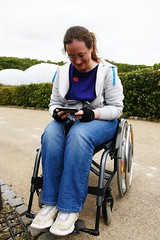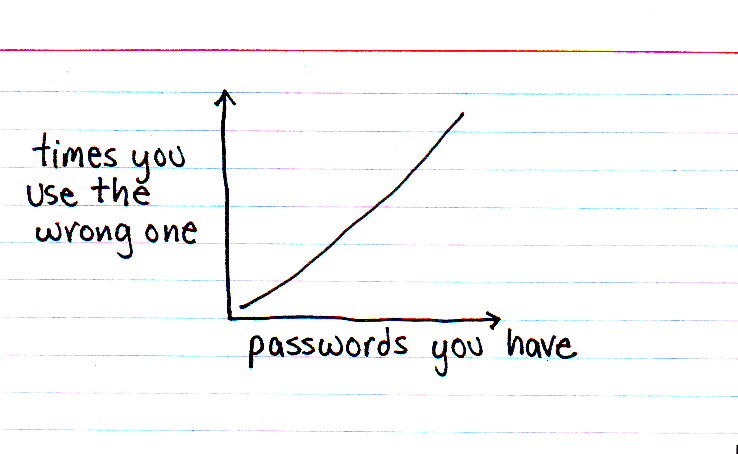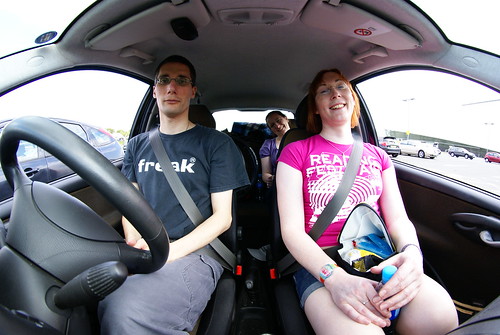Nevertheless.
Part One was done in advance. I found a recipe, of the sort that tells the cook to get an adult to help them with the oven, and went and bought the stuff I'd need.

I think eggs and butter were the only things I had in the house anyway, and I didn't have enough of either, so I purchased the whole recipe. Using mostly supermarket-own-brand ingredients this came to about £15. Admittedly I have a lot of stuff left over - flour, sugar, icing sugar, vanilla essence - but I'm really unlikely to use any of it. Even if we just add up the things that were entirely used up it comes to over £8. It would definitely have been cheaper, in monetary terms, to just buy a cake.
Nevertheless, again. This is not about eating cake. This is about making a cake.
Greasing the cake tin wasn’t too traumatic. Measuring ingredients was a bit okay if a little messy at points. Creaming the butter and sugar brought me back to that whole "DLA for a reason" thing. But that's okay, because the difference between making a cake and cooking a meal is that I can take as long as I like to make a cake, and it doesn't matter if it's the only thing I do today (I will now stop banging on about DLA. I'm just always worried, when I post about my biannual adventures in cookery, that someone's going to try and use it to report me).
Adding the eggs to the butter and sugar was… well it started okay and then I thought it looked a bit lumpy, but no matter how much I stirred the lumps wouldn’t go away, so I figured, it’s butter, it’ll have to melt when it cooks if nothing else, and pressed on, adding a tidge of vanilla essence, a tidge of milk, and the sifted cocoa and self-raising flour.
The resulting dough was tasty… uh, did I say tasty? I meant it looked tasty. Yes. Looked. Having no great cake-making expertise I did wonder whether it was meant to be dough. If it was meant to be batter then I’d done something really badly wrong at the measuring stage. But I was too messy to Google it, or to take pictures and ask Twitter. So I kept going.
Wrangling the wodge of dough from the mixing bowl was awkward, and then it kind of sat in a big sticky messy lump in the middle of the cake tin. It didn't really look like any kind of proto-cake so I sort of splatted it out a bit. Not squished it flat or anything, but made it a bit more circular and more evenly shaped. I probably should have taken a picture before it went into the oven, but it was already in the oven when I realised that, and even I know you're not allowed to keep opening it.
The time it took to bake was longer than the time I needed to find instructional videos on how to check a cake is done and how to get it out of the tin. I have a springform cake tin with a removable base, so getting the cake onto the cooling rack was remarkably easy. A couple of people have already expressed jealousy about my cake tin. Seriously, it cost less than the cake ingredients. If you enjoy baking, and are frustrated by normal tins, then just get one.
And lo! Cake! Properly baked, not dry, not burnt, not soggy!

There was, however, one small problem.

At just an inch and a half in height, the stage of the recipe that called for cutting the entire cake in half horizontally was going to be more of a challenge than this novice could handle. Happily, I'd been looking for a way to avoid that particular challenge anyway, so it didn't take me too long to decide that actually, I'd just cut the cake in half the easy way, and stack the halves into a semicircular cake.
I mixed up the filling and while that was chilling in the fridge, I had my lunch:

It was very tasty.
Finally, it was time to assemble the cake.
From this side it pretty much looks like chocolate mousse with cake somewhere in the middle...

... but from the other side it looks much more cakelike.

If I was doing it again, I would probably try and get a smaller cake tin. I also think that while the whole raspberries look good on the top, for inside the cake, making it a sandwich of chocolate filling on one side and raspberry jam on the other would work better than thick chocolate filling with whole raspberries added.
I have a great sense of accomplishment for having successfully made a cake. All things considered, though, I probably won't be doing it again. The cost of ingredients, the pain, the time, the cleanup, are just all too much for what's basically a pretty mediocre cake. In future I will continue to outsource all of my cake requirements to the lovely experts at Sweet As.
























